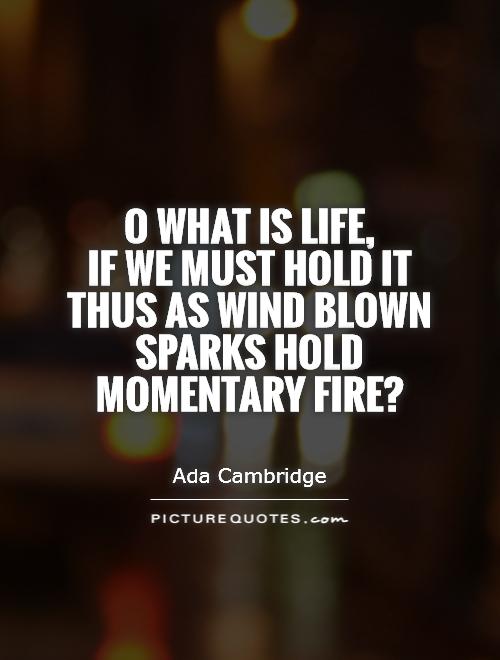O what is life, if we must hold it thus as wind blown sparks hold momentary fire?

O what is life, if we must hold it thus as wind blown sparks hold momentary fire?
Ada Cambridge, a prominent Australian writer of the late 19th and early 20th centuries, often explored themes of life, love, and the fleeting nature of existence in her works. In her novel "The Three Miss Kings," Cambridge delves into the complexities of human relationships and the impermanence of life, posing the question, "O what is life, if we must hold it thus as wind blown sparks hold momentary fire?"This poignant question speaks to the transient nature of life and the fragility of human existence. Cambridge suggests that life is like a fleeting spark, here one moment and gone the next. Just as a spark is quickly extinguished by the wind, so too can life be snuffed out in an instant. This metaphor underscores the brevity of life and the importance of cherishing each moment.
In "The Three Miss Kings," Cambridge explores the lives of three sisters who navigate the complexities of love, loss, and family dynamics. Through their experiences, Cambridge highlights the fleeting nature of happiness and the inevitability of change. The sisters must confront the impermanence of life and come to terms with the fact that nothing lasts forever.
Cambridge's exploration of the transience of life is a powerful reminder to readers to appreciate the present moment and not take anything for granted. Just as a spark can quickly fade away, so too can life slip through our fingers if we are not mindful of its fleeting nature. By posing the question, "O what is life, if we must hold it thus as wind blown sparks hold momentary fire?" Cambridge challenges readers to reflect on the brevity of life and the importance of living each day to the fullest.












 Friendship Quotes
Friendship Quotes Love Quotes
Love Quotes Life Quotes
Life Quotes Funny Quotes
Funny Quotes Motivational Quotes
Motivational Quotes Inspirational Quotes
Inspirational Quotes